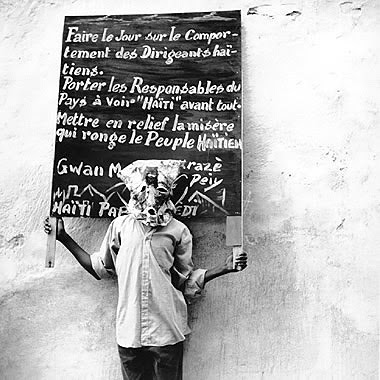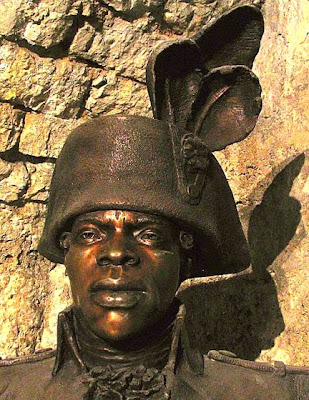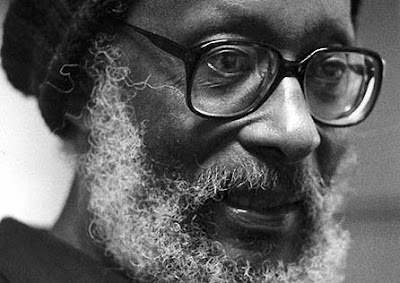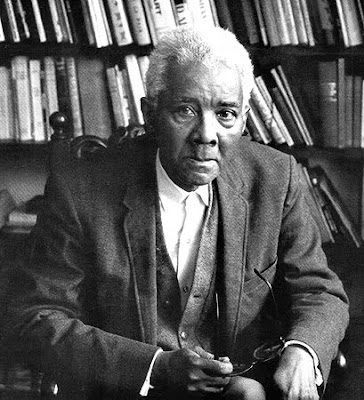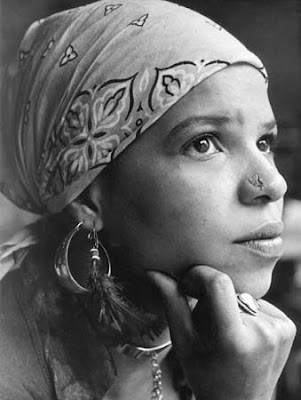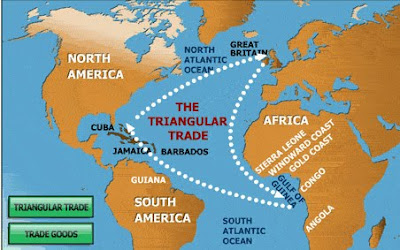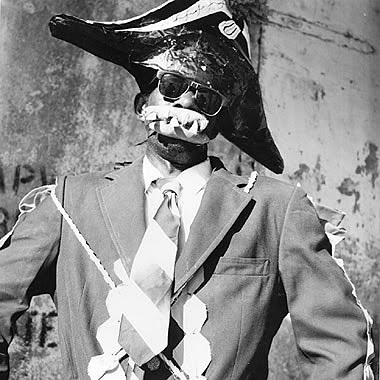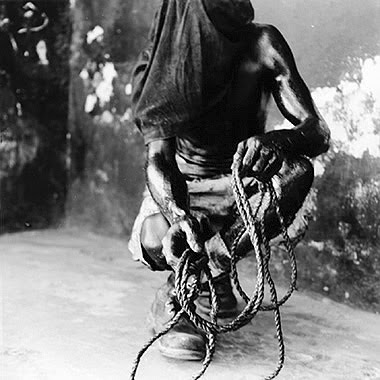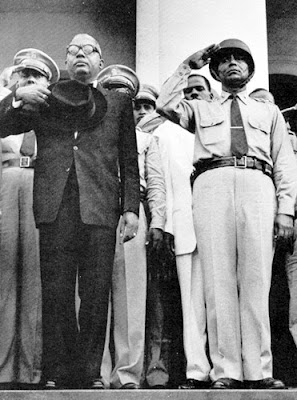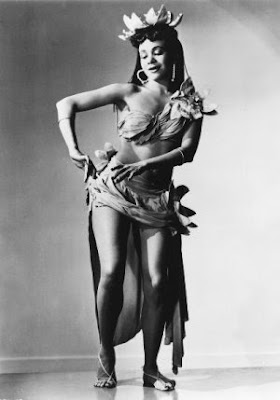Letter to Haiti
Photographer: Leah Gordon
Haiti, I weep for you. I hide my tears because I’m on a flight from Kelowna, British Columbia, to Toronto, and who knows, with all the heightened security I fear they may think something’s amiss. That I’m weeping as a prelude to joining my ancestors. So paranoid have we become. But I weep for you, Haiti, for your people, for the shit — the unmitigated shit — that life seems to throw your way. Again and again. And, to adapt the words of one of your warrior daughters, Maya Angelou, “still you rise,” to greet another green, tropic day that holds hope ransom, as you tear your people limb by painful limb from a hell that eschews fire and opts instead for the hardface, stoneface indifference of concrete that, Medusa like, seems to have frozen all of your magnificent history into slabs of cement. Now fragmented they litter your landscape as if some giant, angry at us mortals, had decided to stamp on your already precarious country. There was a time when our Caribbean houses kept faith with wood, whether one-room homes — some call them chattel houses — or larger, more graceful estate houses. Time was when the thatched Ajoupa bequeathed us by Taino, Arawak and Caribwould have swayed to the groans of the earth as she eased her suffering, opening herself along her wounded fault lines to the ever blue skies, the constant love of the sun, to release all her pent up grief for us, birthing we don’t yet know what. Time was when hands steeped in skills of building homes brought from a homeland a slap, kick and a howl away, across a roiling ocean, would have gently patted mud over wattle, weaving branches to create cool interiors, shaping shelters from the earth that would not, could not, betray the safety in home to crush, obliterate, to fall down around your ears. Like the third little pig in the nursery rhyme, Haiti, you built your home of brick — it was supposed to protect you.
Toussaint L'Overture
Each and every time I hear or read the words that describe you as being a poor nation, the poorest of the poorest — I weep. Poor you most certainly are in all things material, but your riches are immeasurable, woven through your history, your culture and your people. Yours was the first and only successful slave revolt in the Western world and resulted in the second independent nation after the United States in the so-called New World. In taking the name the Taino had given the “Land of Mountains,” Ayiti, you returned the country to its First Nations roots. How many know that the USA embargoed you for sixty years because you fired a shot across the bow of history by liberating your people under the brilliant leadership of Toussaint L’Overture? How many know that you became a pariah in the world for taking a moral stance in favour of justice and freedom and against racial exploitation and oppression? Then, you were at another epicentre, along one of the many fault lines of history, the reverberations of which seismic, political shift would be felt around the world. Indeed, are still being felt, I would argue. No one rushed to help you then, Haiti. Instead, what we had were France, Spain, Holland, Britain and the United States (albeit secretly) — shall we call them the coalition of the ready, willing and able, or simply the usual suspects? — preparing to invade you to re-impose the yoke of slavery. How many know that your liberation determined the eventual downfall of Napoleon? So decimated were Napoleon’s troops under his brother-in-law, General Leclerc, by fighting in Haiti and by yellow fever, they could not provide the necessary support for Napoleon’s subsequent campaigns in Europe — against Spain, Russia and Prussia to be exact. In November 1803, France, under Napoleon, capitulated. In January 1804, General Jean Jacques Dessalines declared you an independent nation. How many know that France, that bastion of revolution and freedom, by the Ordinance of 1825 exacted the sum of 150 million francs as compensation from you for loss of “property” — read: formerly enslaved Africans? How many know or even care to know that you did, indeed, pay your extortioner through a series of loans that bankrupted you? The equivalent of that sum is $21 billion in today’s money. And how many know that the USA invaded you in 1915 and occupied you until 1934? Hearing that the US military now controls the airport makes me shudder. Makes me want to hold my head and bawl.
Despite the historical and contemporary demonisation ofVaudon, you have enshrined the religion of your ancestors in your constitution, making it an official religion alongside Christianity.
Writer: Kamau Brathwaite
Only South Africa among a continent of African nations has dared to do this — most flee this reminder of who they are. No other Caribbean island nation has followed suit. Most of all, Haiti, you are rich in your people — their dignity, their love of homeland and willingness to struggle for freedom. What more fitting example of this is the recognition of the language of the people,Haitian Creole, as an official language? With the exception of the three formerly Dutch colonies, Aruba, Bonaire and Curacao, no other Caribbean island nation has officially recognised the language of the people, for the people and by the people — the vernacular, the demotic — Kamau Brathwaite’s nation language — as worthy of recognition. Ah, but most of all, Haiti, I weep for the “dream deferred” that Langston Hughes so eloquently wrote about. What has happened to the many deferred dreams of your people? Where have they gone? How many know that at the start of your fledgling nation in 1804, democratic principles were central to your constitution? First, you abolished slavery, then moved to enshrine one of the most frighteningly revolutionary and emancipatory ideals in your constitution — racial equality — even granting citizenship to Polish soldiers who had fought alongside Haitians against the French. In 1804 that would have been the equivalent of an earthquake measuring at least 8 on a Richter scale of oppression. You were at the heart of the awakening of modernity — albeit a deferred modernity. More than anything else, you presented, in the words of the Canadian poet, Jordan Scott, a profound “threat to cohesion.” The cohesion of imperial power founded on brute racism.
Writer: CLR James
I weep for you, Haiti, and for I ‘n’ I, because when I bear virtual witness to your despair and your suffering, when I see the mountains of rubble and concrete, the broken roads, the tangle of electrical wires, and hear the voices droning on and on about the lack of infrastructure, I think of my own internal infrastructure — spiritual, psychic, intellectual and political — and realize that your history has played no small part in its structure and design. I recognize you writ large through CLR James’ The Black Jacobins that I first read as a young Caribbean woman trying to find her place in a world and a history that had hardly begun to be told. Your history, your struggle, your survival, epitomised through the successful Haitian revolution, as told by James, became a part of my own struggle to understand my place and the place of my people in this world — on all those tiny pieces of coral or volcanic rock scattered in the ever blue Caribbean Sea. Through The Black Jacobins we, each and every one of us who read that work, grew in stature internally as Caribbean people, children of the volcano all, to quote the brilliant Martniquan poet and founder of negritude, Aimé Césaire; became larger psychically, and more intellectually secure in our role as agents of change. In our own history.
The Haitian revolution became woven into our psychic and political DNA, a scaffolding to support our personal structures of personhood; an aide memoire to our silenced history, a map for our journey to greater self-awareness.
Writer: Ntozake Shange
Toussaint’s name lived in our minds and on our tongues as young Caribbean thinkers, the first generation to have access to widespread, tertiary level education. The coloniser’s language may separate us, but only superficially, for CLR James who brought your struggle home to us and helped us to understand ourselves through the lens of history, is as much a son of yours as Boukman, Toussaint, Dessalines or Christophe. Indeed, your daughters and sons know no borders. For African-American poet and writer, Ntozake Shange, “TOUSSAINT waz a blkman...who refused to be a slave...TOUSSAINT L’OUVERTURE waz the beginnin uv reality” for her. A dazzling, polyvocal, linguistically innovative tour de force, for colored girls who have considered suicide/when the rainbow is enuf, although located in the US, grounded itself in a historical reality that began with Toussaint.Samuel Huntington (him of The Clash of Civilizations) had the impertinence to describe you as “the neighbour nobody wants” and as being “truly a kinless country,” and in so doing reveals how little ignorance respects knowledge. Little does he know how far, how wide and how deep your kin are spread.I gaze at a map of Port au Prince in a newspaper identifying high profile sites of destruction: it is as if someone decided you had to start again, and wiped the slate clean: the Ministry of Justice — gone; the Presidential Palace — gone; administrative offices — gone; the penetentiary — gone; the hospitals — gone; churches — gone; the cathedral — gone. Hundreds of thousands of people — gone. All gone — just like that. In the clichéd wink of an eye — God’s perhaps? Or the devil’s snap of fingers. Leaving nothing but bright mornings filled with mourning, despair, grief and pictures of little Black girls with locks made blonde by concrete dust, who look out at the world through glasses, bearing the weight of history and a building on their little legs. Oh God, oh God, why hast thou forsaken us? This is the language — the language of the Bible — that bursts forth, as if the apocalyptic nature of the disaster itself demands a language of Biblical proportions. Because flesh hurts, and love and grief know no bounds when your loves are entombed before your very eyes, sometimes leaving no one to mourn, no one to cry out, Why? Why? Why? And, worse than that, no one to answer why.
The Middle Passage
There was a time when for five hundred years the world, with very few exceptions, was indifferent to the suffering of African peoples. They entered the maw of a history drenched in brutality, as history most often is, through the doorway of the slave ship and, by way of what we so euphemistically call the Middle Passage, were washed up on these Caribbean islands like so much flotsam and jetsam the Atlantic was rejecting. To enter the machine of the plantation. Who shed a tear, beyond those left in Africa, for those entombed in slave ships? Who shed a tear for those whose bones litter the sands below the Atlantic? Who shed a tear for the living death of the slave plantation? As recently as 2005 we were witness to the indifference that greets the suffering of Black folk in the aftermath of Hurricane Katrina. By their own government. Under George Bush.
This time seems different: the world is responding, although many of those responding have been complicit in beggaring you.
Photographer: Leah Gordon, Chaloska
Always an agricultural nation, you once grew your own rice, then cheap subsidised rice from the USA flooded the nation and your self-sufficiency in rice was lost, so that during the 2008 food crisis (which continues), when the price and availability of staple foods like rice shot up, you were particularly vulnerable. According to Peter Hallward, writing in the Guardianin January 2010, during its occupation of your territory the US “violently and deliberately” resisted “every serious political attempt to allow Haiti’s people to move (in the words of Jean Bertrand Aristide) ‘from absolute misery to a dignified poverty’.” And make no mistake about it, had it not been for the support of the Soviet Union, Cuba would have been beggared in the same way by the embargo the US imposed after the Cuban revolution.The world has found you now, Haiti, but where was it when France was extorting blood money from you, ably assisted by the US who arranged loans to help you repay France — loans designed to break you economically? Where was it? The world. It is against the principles of international law that a victorious country should pay a country it defeated for its freedom, yet the nations of the world have been silent on this travesty. One of the claims Aristide made during his tenure was for reparations from France for these immoral and illegal payments. Where was the support for these claims from the world? Where was the world when the US occupied you? Busily fighting to save Europe from the calamity that Hitler portended, shoring up the principles of freedom in resounding Churchillian phrases, where the fuck was the world? As the flag bearer of democracy crushed a small but proud island nation, and today, even today, as hungry, frantic Haitians take to the seas in desperation, seeking refuge anywhere, even in water as their ancestors did, even today, the US Coast Guard turns them back. Where was the world when the US rounded up your boat people to return them, unlike the Cubans, to their home country? Where was the world, Haiti? And will it still love you when you occupy your rightful place? For occupy it you will. Our very survival — the survival of every one of your children depends on it.Today I saw a little boy birthed from a concrete womb a mere letter away from a living tomb, his rescuers pulling him from the rubble as if he were being born again — for the second time in his so very short life. They snatch his frail-limbed body, whitened with concrete dust and, cradling him in their arms, run with him. And I think, so it was when you defied the long, the very long historical odds against you, and out of the living tomb of slavery created a womb to birth yourself. Blood and all.
Photographer: Leah Gordon, Lancers du Cord
Today, they say it’s your culture that prevents you from moving forward — that vaudon creates a fatalism that is out of step with the ideals of progress endemic to the West. And I wonder why that fatalism didn’t keep you wedded to a slave culture.But what good is history when your child done dead and gone? Or your mother bury under concrete, or your daddy, grandmère or grandpère nowhere? You cyant eat revolution, you cyant drink freedom. And, as the saying goes, a hungry man is an angry man. It is not surprising, but still I am surprised at the rapidity with which the trope of violence has raised its head: not even a week has gone by before the Toronto Star has a front page picture of a naked, bound man being beaten. The following day the headline screams about violence marring the relief efforts. The following day still a front page picture appears of a knife-wielding man appearing to attack someone for food. It’s the stereotype with which the media and those that “run tings” have clothed us. Beggars or criminals. Or sometimes both, as the Star makes out. Even as they purport to help, they construct prisons of stereotypes for us. How quickly the world has forgotten the unspeakable violence that slavery meted out on African peoples for at least five hundred years. Indeed, Leclerc wrote of his intent to “wage a war of extermination” to reintroduce slavery in your barely formed nation. You have never been forgiven for successfully resisting his violent attempt to subjugate you. To decontextualize the violence in Haiti, as the Star has done in those three issues, under the guise of needing to show Canadians the “true horror of this disaster” appears to be nothing more than a crass and racially exploitative attempt to sell more newspapers.
Papa Doc
I will not romanticize your history; cannot pretend that the dreams and hopes of that seminal revolution have not been curdled over the years. Toussaint may have abolished slavery, reorganised the administrative and justice systems, built roads, schools and bridges, but Papa Doc and theTon Ton Macoutes did exist. So did his son, Baby Doc. Class and race divisions in Haiti are alive and pernicious, but when I hear Bill Clinton talk about the need for Haiti to shake off her history, I wonder what history he is referring to. The history of Toussaint, or the history of Papa Doc, or both?And when I hear of George Bush urging people to send money, not clothing, I laugh. I remember him urging his populace after 9/11 to go out and shop. And look where that got them. And I think of Obama appointing these two men and I laugh again. Because if I didn’t, I would sure be crying.Fired in history’s unrelenting sun, we Caribbean peoples who hunger after justice, who long for peace, who have lived cheek by jowl with, and sometimes in the belly of, the beast, have always punched above our weight through history — I need only mention Castro, Fanon, James, Césaire, Wynter, Brathwaite, Walcott, Lamming and Claudia Jones, to name but a few; we grasp the import of our role in history, and no small credit for that must go to Toussaint L’Overture and all the history that swirls around him. We understand, being the subjected to them for far too long, the effects of great power machinations; they continue to reverberate in our tiny island nations as well as in the psyches of the people. The coloniser may have withdrawn but he has left his mark.
Dancer/Activist: Katherine Dunham
The African-American dancer and anthropologist Katherine Dunham, another of your daughters, had a long and deep relationship with you, even becoming an initiate of the vaudon religion. In Island Possessed she describes her relationship with the Haitian people and her involvement in the culture; she talks of buying the plantation that once belonged to selfsame General Leclerc and of her need to cleanse it of the remnants of the sordid, brutal history of empire she could feel on the property. With the help of her Haitian godmother she does, indeed, shift the negative energies she first felt there. The sheer enormity — the apocalyptic nature of this tragedy — makes me wonder if there is something larger at work here, with you, Haiti, once again being at the epicentre of some violently physical, yet spiritual, temblor, echoing that earlier one two centuries ago. Is this simply, and not so simply, the human longing and search for meaning on my part? Is it this urge to find meaning in our lives and experiences, particularly catastrophic ones, that drives the likes of Pat Robertson, a so-called man of God, to describe your plight as punishment for making a pact with the devil — a comment so egregiously lacking in compassion as to take the breath away? If nothing else he has made the choice very clear: if fighting to free one’s self puts you on the side of the devil and being on the side of God puts you in a place where, like him, you cannot express a scintilla of compassion for another’s suffering, then my sympathy will be with the devil. Always. It is early days yet, I tell myself, to attempt to find meaning in this violent catastrophe whose scale and scope often appears to exceed language, even as my mind feverishly tries to find meaning. Trying to link your history as an unblinking beacon for the Black struggle for civil and human rights, for the quest for freedom, for justice and for dignity on the part of African peoples, to this present maelstrom, as if we didn’t have maelstroms aplenty already. Indeed, in this time of acute suffering it feels premature, if not sacrilegious, to rush to meaning. So, I resist that, for the present, understanding and accepting that any meaning to be found, lies, perhaps, in the sheer absence of meaning — shit just simply happens, it seems. But I do recall another of your English speaking sons, the novelistGeorge Lamming, who feels the heft of your history, making reference years ago in The Pleasures of Exile to the Haitian Ceremony of the Souls, which brings together the people and their ancestors — the living and the dead. What links them is a shared interest in their future — in the one case continued life, in the other eternity. There is a sense in which James’ The Black Jacobins drew us all in the Caribbean into an extended performance of the Ceremony of the Souls: we, the living descendants of the enslaved, being in active relationship with the memory of Toussaint and his supporters. Today your dead lie all around you, and despite the lack of dignity of their final resting place, you honour them in your deep dignity, notwithstanding the pictures of theStar, and in your resilience.And once again, through your undeserved suffering, but then suffering of the innocent is never deserved, you become a symbol for me, for us all — your children in spirit — a symbol of the will to survive in the face of apparently insuperable odds. It is what makes us human and simultaneously calls on our humanity. In that respect, we are all Haitian.Many years ago, David Rudder, one of Trinidad and Tobago’s most beloved performers, sang a soca ballad titled “Haiti,” its refrain a simple lament: “Haiti, I’m sorry.” It begins: “Toussaint was a mighty man/ and to make matters worse he was black/ back back in the time when a blackman’s place was in the back.” The ballad recounts your history and how badly served you have been by history; how we, and in particular Caribbean peoples, have misunderstood you, turning our faces from you. It pains me that more of our island nations have not, over the years, offered refuge to your people — how many heads of state from the Anglophone Caribbean attended the two hundredth anniversary of your revolution in 2004? One, I believe. Haiti, I, too, am sorry, but I do not weep for you, for that would be to pity you; I weep with you, Haiti, with compassion, wanting to share your suffering, which lies at the root of the word compassion. Today I am Haitian and forever in your grief and your undeniable survival, because survive you will. You must. For all our sakes. All I have are my broken words. And my tears. And my more tears. My so many more tears. With you, Haiti.Viva Toussaint! M. NourbeSe Philip is a Canadian poet, novelist, playwright, essayist and short story writer. One of this blogger's favourite writers, find further information on her by visiting her Web site: Nourbese.com. Leah Gordon is a Haitian-based, UK-born, photographer and documentary filmmaker who greatly assisted with Haiti's 2009 Ghetto Biennale. View a wonderful excerpt of her film Atis-Rezistans: The Sculptors of Grand Rue. And please visit her Web site: LeahGordon.co.uk. "Letter to Haiti" is copyright of M. NourbeSe Philip and is republished with her permission.
